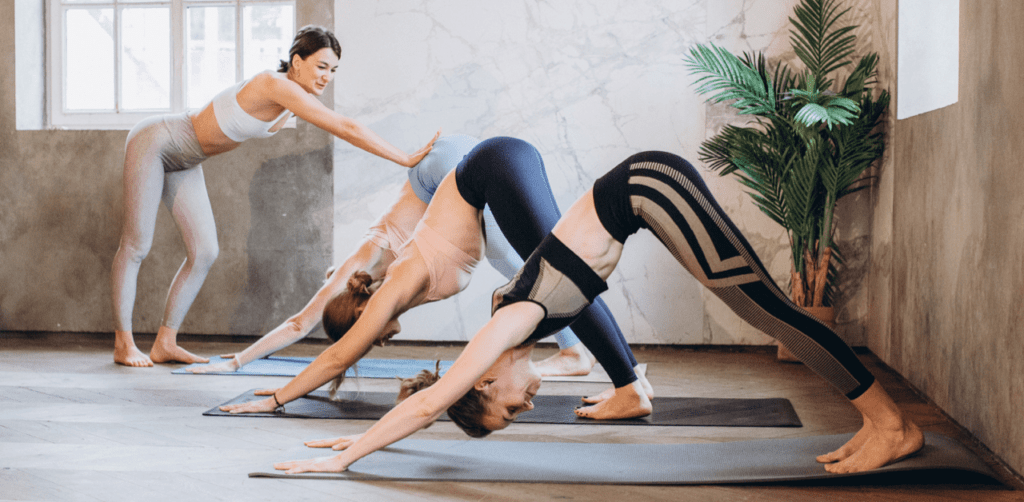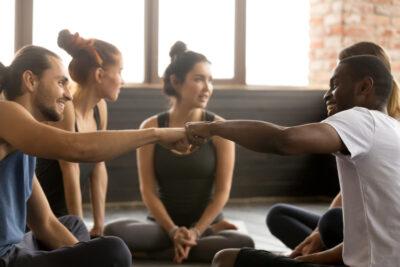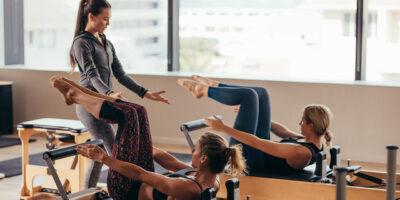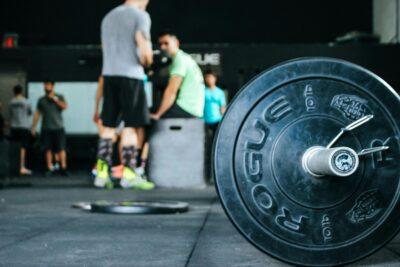Becoming a fitness instructor can be a great career if you love fitness and enjoy helping others achieve their goals. With a rise in group fitness, there continues to be a demand for talented instructors who can motivate and inspire clients. As we look toward 2021, specialized group training in a COVID-secure environment is set to increase. This is especially important for people with health concerns and the elderly. As more fitness goes online, there’s a need for instructors to deliver incredible experiences both in-person and digitally. In this article, we break down everything you need to know about being a fitness instructor. Skip ahead to:
- What Does a Fitness Instructor Do?
- How Much Do Fitness Instructors Make?
- What Qualifications Do You Need to Be a Fitness Instructor?
- 11 Skills You Need to Be a Great Fitness Instructor
What Does a Fitness Instructor Do?
A fitness trainer leads groups and individuals in exercise. They demonstrate the correct way to exercise and use the equipment before leading a class or individual. On top of leading a training session, the instructor must monitor client progress, offer adjustments where needed for different fitness levels, enforce health and safety, give clients fitness information, and offer basic emergency first aid.
A great fitness instructor has technical and industry knowledge and the soft skills to communicate, organize, and motivate clients. They can build relationships and understand how body language and tone can deliver an effective training session for members. In addition to this, it’s common for fitness instructors to run digital classes and market their services. This means that a good understanding of technology and digital platforms can help put instructors in a strong position to run both online and offline classes.
A fitness trainer is quite a broad term. You can get different types of instructors, depending on where you want to progress in your career. You have personal trainers, certified group fitness instructors, and specialized fitness instructors. Normally, a fitness professional may start off with a more board qualification in fitness instruction or personal training before specializing in a specific area. With the relevant fitness certification, qualified instructors can lead a range of classes from Yoga and aerobics to strength training and kickboxing.
How Much Do Fitness Instructors Make?
If you’re considering a career as a fitness instructor, salaries can differ depending on your location and seniority. In general, fitness trainers can make an average of $24,000 – $36,000. Training sessions in New York average the highest pay.
Fitness instructors can be paid in a number of different ways. Depending on your situation, you may be paid hourly or on an annual salary. Some instructors and personal trainers are self-employed and may be paid per class or gyms, and fitness centers employ hourly, while others as full-time employees. The average hourly rate for fitness instructors ranges from $20 – $40, according to Indeed.
What Qualifications Do You Need to Be a Fitness Instructor?
As a fitness enthusiast, you have probably already started your unofficial training at the gym or at home. If you have decided that a career in fitness is for you, you can take the next step of getting certified. Getting certified can help you land a job at a gym or fitness studio or become self-employed.
Firstly, you need to choose a training course that is accredited by a reputable body. In the fitness industry, the National Commission for Certifying Agencies (NCCA) is the gold standard for accreditation. This keeps the standard of practice the same across healthcare professionals.
There are several reputable organizations that offer accredited courses to become a fitness instructor. There are hundreds of qualifications, depending on the path you want to take, and most will include some form of exam. Ideally, you want to find a universally recognized qualification. Some well-known certification organizations include:
- American Council on Exercise (ACE)
- American College of Sports Medicine (ACSM)
- National Academy of Sports Medicine (NASM)
- National Federation of Professional Trainers (NFPT)
- Athletics and Fitness Association of America (AFAA)
The majority of qualifications require at least a high school diploma, a CPR certification, and a minimum age of 18. Qualifications differ slightly depending on who you choose. They can include workshops, online study, certification exams, and seminars. After getting certified, you can then select a specialty within fitness instruction and personal training.
To maintain your qualification, you will need to complete several continuous education hours. Most qualifications have a continuing education requirement to renew the certificate. Generally, continuing education helps you stay on top of industry knowledge, develop your skills, and further your career.
11 Skills You Need to Be a Great Fitness Instructor
A fitness instructor needs a combination of hard and soft skills to lead and inspire. While good fitness is a given, not everyone can motivate members and hold clients accountable. Your attitude and approach to fitness and people are just as important as your technical and industry knowledge. Here are 11 skills you need to be a great fitness instructor.
The Top 10 Barriers
Slowing Your Fitness
Business Growth
Discover more Ability to Motivate and Inspire In-Person and Online
Aside from expert fitness knowledge, fitness instructors can motivate and inspire others to hit their goals. The best instructors inspire their clients to show up consistently. This plays a significant role in how successful you are. You need to be able to motivate your class with instruction and advice. If they fall off the exercise wagon, you need to be able to get them back on board. As many group exercise classes are currently held online, instructors need the ability to motivate from a distance. One of the biggest challenges for fitness instructors is creating an in-person class’s vibe and energy in a virtual setting.
Industry Knowledge and Qualifications
Whether you go down the route of personal training or group fitness instruction, you will need industry knowledge and qualifications. Sometimes, a personal trainer will choose to teach a group fitness class. So, there can be a lot of crossover between personal trainers and fitness instructors. Depending on how you intend to help people, you will need the knowledge and qualifications to position yourself as an expert. This may include qualifications in nutrition, health, and fitness. By continuing your learning, you can stay on top of industry knowledge, expand your services, and attract new clients.
Good Communication
You’re responsible for helping members achieve their health and fitness goals. If you can’t communicate effectively, this will severely impact your ability to do your job. To build a loyal membership base, you need to offer instructions and advice to your class. Your communication skills also play a role in your ability to motivate and inspire individuals. Although a lot of your time is spent giving instructions, you need to be able to listen to your clients so that you can help them make the most out of your class. This includes picking up on body language and tone.
Empathy and Compassion
Empathy allows you to put yourself in the shoes of your clients. To succeed in your role, you need to inspire your members to consistently show up. When you are compassionate and show empathy, you can figure out why someone may be struggling with your class. For example, if you notice a class regular has missed your last two sessions, you could drop them a note to make sure they feel safe and comfortable to join your class. Being able to see yourself through your clients’ eyes allows you to make changes for the better.
Patience
Often, members join classes and sign up for their favorite fitness instructors to see immediate results. It’s your responsibility to set expectations and to introduce a little patience to your class. Gradual and sustainable improvement is the way forward, and only with a little patience will your clients see long-lasting results.
Passion for Fitness
The majority of fitness instructors have a passion for fitness well before they started their careers. You can’t learn passion. When you’re passionate about fitness, it shines through in your work. Your passion helps to create the kind of class energy that nurtures a loyal base of members.
Fantastic Planning and Organization Skills
Instructors and trainers often need various entrepreneurial skills, including planning and organization. You will be working closely with lots of different people. Planning and organizing classes and fitness programs for your clients will help you deliver fitness training effectively. As a self-employed fitness instructor, you will likely be more involved in all your classes’ planning stages. Whereas, at a gym or health club, they may have all classes planned out for you. Either way, you will need to organize your time well to deliver a great fitness experience online and offline.
Positive and Approachable Personality
If a member struggles to keep up or has a question, you want them to feel confident in approaching you. Of all the ideal characteristics of an instructor or trainer, being approachable is key. It means that clients will talk to you easily. If you appear more friendly and approachable, members will be more likely to ask questions or even sign up for more of your classes. You want all members to feel like they can approach you and be honest. If they are scared to speak to you, they may not want to say if they are struggling to work out consistently. Eventually, they will stop seeing results and stop showing up.
Good Physical Fitness
Whether you teach an online class, an outdoor boot camp, or individuals, you need to be strong enough to demonstrate all the exercises. Members look to you to guide and advise them on the best way to move their bodies for the most benefit. This means that you need to be physically fit to show any different variations and movements. Having a fit and healthy body will help you attract new customers to your class, but your knowledge, personality, and technique will keep them coming back again and again. That’s why it’s so important for fitness instructors to have a combination of skills.
Digital Fitness Knowledge
The coronavirus pandemic forced many businesses to pivot to a digital way of working. Many gyms, fitness studios, and instructors are running both digital and in-person classes. Having a good understanding of digital fitness and the tools you need to stream or record a great class is crucial. At times, you may need to set up your camera equipment and mic to stream a live studio session. It’s essential to know how lighting and sound can impact the user experience. Many instructors now have to think about creating the best class experience digitally and how they can tap into the home workout audience.
Social Media and Marketing Experience
For gyms and fitness brands, social media marketing is essential. Whether it’s going live on Instagram for a quick class update or sharing a behind the scenes glimpse of a new training style, social media is a great place to engage and motivate your audience. If you’re an employee for a gym, they will likely be in charge of the overall marketing strategy. However, you will play a role in posting content. As a self-employed fitness instructor, you tend to wear many hats, including marketing. Social media and marketing experience can put you in a strong position to market your services and expand your reach.
In Summary
As a fitness instructor, your job is to help people improve their fitness and wellness. From leading fitness classes to teaching members how to use the equipment and demonstrating exercises, every day can look a little different. Although you need qualifications and technical and industry knowledge, your personality and ability to motivate will make you a great fitness instructor. The fitness industry is constantly changing, so it’s essential to stay on top of the latest trends and continue learning. Like many fields, being a fitness instructor is hard work, but it can be very rewarding. A successful fitness instructor will see happy participants and high attendance rates.















